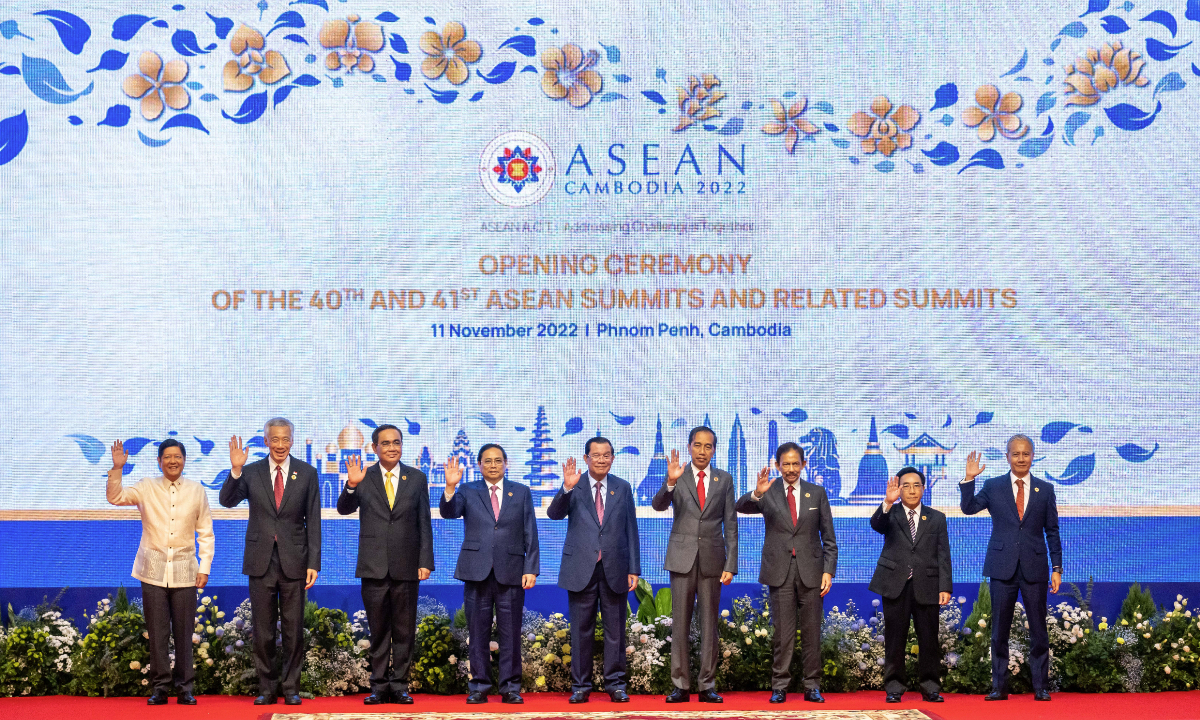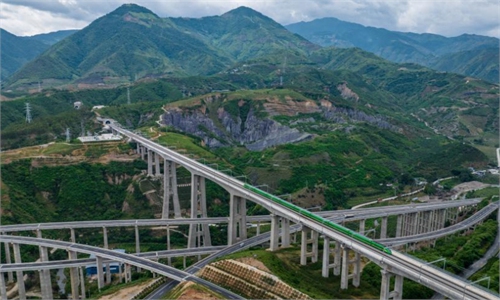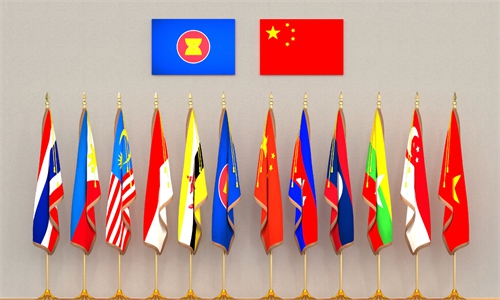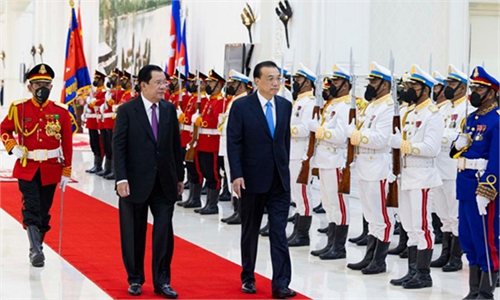ASEAN leaders stress cooperation, centrality
US efforts to decouple group from China ‘may destabilize Asia’

Leaders of the Association of Southeast Asian Nations (ASEAN) take a group photo in Phnom Penh, Cambodia, on November 11, 2022, as the 40th and 41st ASEAN summits and related summits officially kicked off that day. Photo: Xinhua
ASEAN leaders on Friday adopted multiple statements calling for enhanced cooperation for regional peace and development as well as joint work against the impact of COVID-19 pandemic at their first in-person meeting since the pandemic, as the world ponders how ASEAN can strengthen solidarity amid a turbulent international situation and play a potential bridging role among big powers to find a way of cooperation.
The leaders agreed to strengthen principles of ASEAN as enshrined in the ASEAN Charter to support the group's continued development into a peaceful, stable, resilient and economically competitive region, according to a relevant statement.
They agreed to "strengthen ASEAN centrality in the ASEAN-led mechanisms in promoting peace, security and prosperity, and shaping an open, transparent, inclusive and rules-based regional architecture," Xinhua reported.
They also agreed to "intensify efforts to comprehensively address the socio-economic impacts of COVID-19 and to build back stronger from the crisis with a view to maintaining inclusive, resilient, competitive and sustainable growth," according to Xinhua.
They called on all external partners of ASEAN to demonstrate their cooperative efforts to achieve regional peace, security, stability and prosperity through the ASEAN-led mechanisms and frameworks.
The meetings between the leaders are expected to help break down walls and deepen communication, Xu Liping, director of the Center for Southeast Asian Studies at the Chinese Academy of Social Sciences, told the media.
Xu pointed out that the summit is being held when the world is facing various uncertainties, including the Russia-Ukraine conflict, a global energy crisis and a food crisis. Unlike previous summits that focused on economic cooperation, this year's events will focus more on regional security, peace and stability.
Issues such as the Russia-Ukraine conflict, China-US relations, the South China Sea issue, the situation in Myanmar, and East Timor's application to join ASEAN are all potential topics of this summit. ASEAN countries are concerned about the state of the game between major powers, and also worry that economic recovery and economic and trade cooperation will be affected. They also pay special attention to the policy direction of China's high-level opening up following the 20th National Congress of the Communist Party of China, experts noted.
ASEAN announced on Friday that it had agreed in principle to admit East Timor as the group's 11th member, more than a decade after the country applied for membership, Reuters reported.
The half-island nation, officially called Timor Leste, will also be granted observer status at high-level ASEAN meetings.
East Timor President Jose Ramos-Horta welcomed the decision, saying membership would open up his country to wider diplomatic relations with ASEAN's partners, potentially more foreign direct investment, and give Timorese wider travel access within the region, according to Reuters.
Chinese Premier Li Keqiang is scheduled to attend a series of events, according to China's Foreign Ministry. US President Joe Biden will also attend ASEAN and East Asia Summit meetings from November 12 to 13 after participating in the COP27 and before joining the gathering of G20, Reuters reported.
When Biden attends the annual summit of ASEAN this week in Cambodia, he will become the first US leader to make that trip since 2017. This shows Washington's unease in the face of China's development and growing regional impact, which is why the US is trying to engage with the region again, BBC said.
Experts warned of the US' potential efforts to decouple ASEAN with China, noting that the region should enhance cooperation amid a turbulent world rather than fall into the US' trap to view China as a target.
East Asia's cooperation model originated from the Southeast Asian financial crisis and has gone through a course of more than 20 years. Xu Liping pointed out that, in general, it is driven by crisis, adhering to the spirit of mutual respect and win-win cooperation, and taking care of each other's comfort more. It not only condenses Eastern wisdom, but also contributes Asian strength to global governance.
The Yonhap News Agency reported Friday that South Korean President Yoon Suk-yeol promoted a South Korean version of the "Indo-Pacific strategy" at a meeting with ASEAN leaders that day.
There is no need for South Korea to do so, since the country and ASEAN already have a free trade agreement and both are involved in the Regional Comprehensive Economic Partnership Agreement (RCEP), which offers wider regional opening-up and integrated development, Chen Fengying, an economist and former director of the Institute of World Economic Studies at the China Institutes of Contemporary International Relations, told the Global Times on Friday.
Asian economies are faced with growing challenges and uncertainties amid a complex international situation. While the global economy grapples with surging inflation, growing protectionism and ideology-driven decoupling, Western politicians' hype of the South China Sea issue and the US' aim of luring ASEAN to decouple from China may result in negative consequences to regional economic cooperation, according to experts.
Against this backdrop, RCEP members including South Korea should strengthen political cooperation to build a firewall against regional economic and security risks, Xu Ningning, executive president of the China-ASEAN Business Council, told the Global Times on Friday. "In addition, those economies should explore new growth momentum by strengthening economic cooperation, and create favorable social conditions through people-to-people and cultural exchanges," he said.
"The US-China relations are the most important relations, not just to the two countries, but also to our regional development as well," Kung Phoak, Secretary of State of the Ministry of Foreign Affairs and International Cooperation, Cambodia, told CNBC on Thursday, before the summit officially started.
Just last month, the US restricted China's ability to obtain and manufacture some specific types of advanced computing chips, thereby crimping China's access to key technology.
"ASEAN remains neutral in this competition and we don't want to choose sides. ASEAN wants to work closely with both countries," Kung Phoak was quoted as saying by CNBC.



